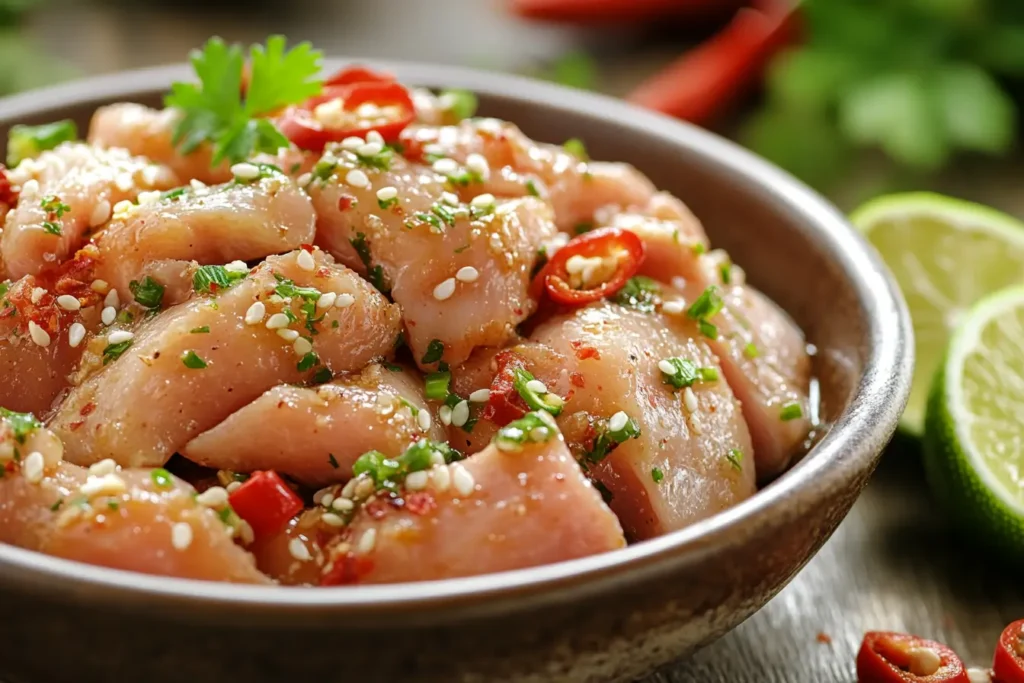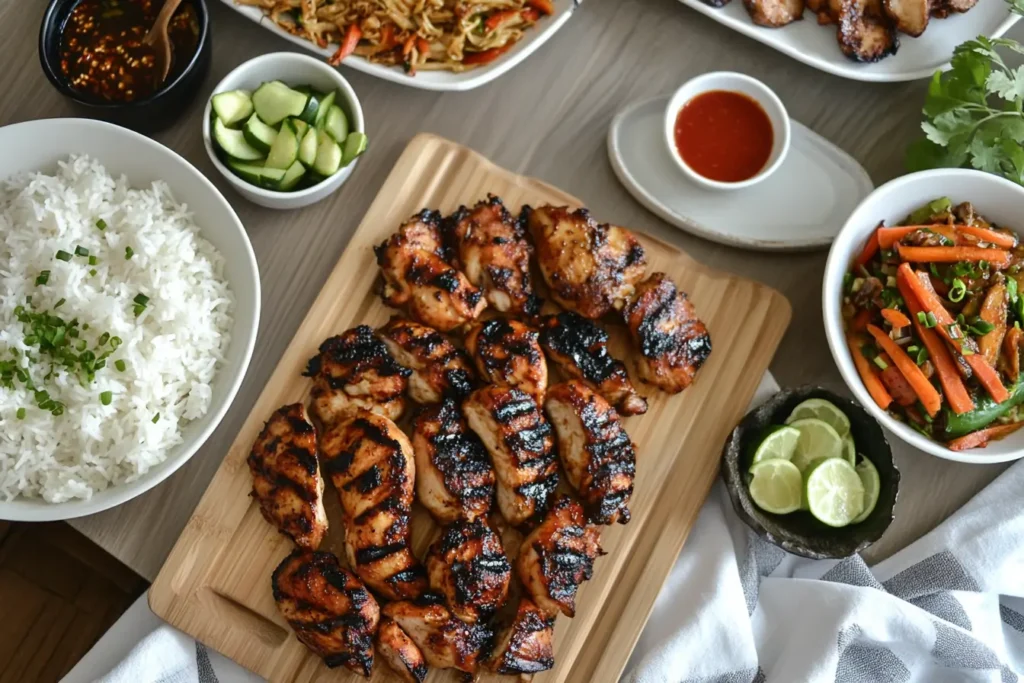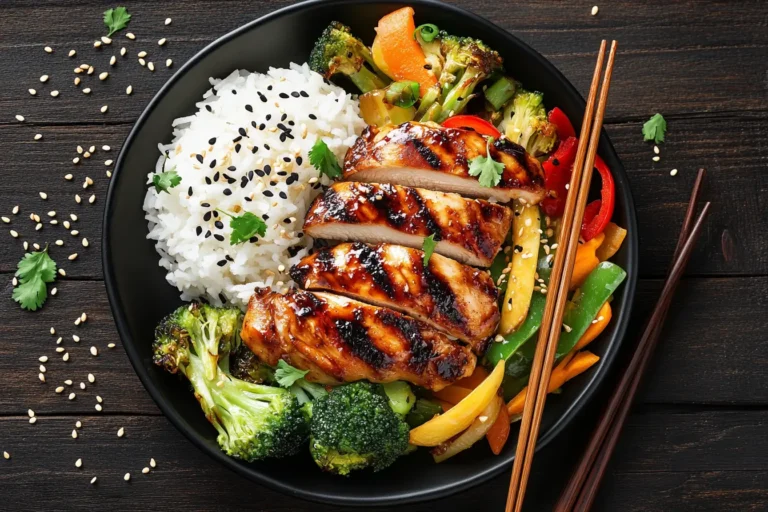When it comes to transforming plain chicken into a meal bursting with flavor, Asian chicken marinades are the ultimate game-changer. Packed with bold, savory, and sometimes sweet notes, these marinades infuse chicken with layers of deliciousness that are hard to resist. Whether you’re grilling, baking, or stir-frying, a good marinade can elevate your cooking to restaurant-quality levels.
In this guide, we’ll dive into everything you need to know about Asian chicken marinades. From the essential ingredients and popular variations to cooking tips and pairing ideas, we’ll cover it all. By the end, you’ll be ready to whip up your own mouthwatering marinade and create a dish that’ll have everyone asking for seconds.
Introduction to Asian Chicken Marinades
What Is an Asian Chicken Marinade?
An Asian chicken marinade is a flavorful mixture of ingredients used to tenderize and season chicken before cooking. The hallmark of these marinades lies in their balance of flavors—think salty soy sauce, sweet honey, tangy rice vinegar, and aromatic garlic and ginger. These components work together to penetrate the meat, ensuring every bite is infused with bold, savory goodness.
Unlike simple seasoning blends, marinades actively work to tenderize the chicken. Acidic ingredients like lime juice or rice vinegar break down proteins, making the meat juicier and more tender. When paired with heat, the sugars in the marinade caramelize, creating a mouthwatering glaze that’s rich in umami.
Why Marinades Are Essential for Flavorful Chicken
Let’s face it—chicken on its own can be a bit bland. That’s where marinades shine! They don’t just flavor the surface; they seep deep into the meat, transforming it into a flavorful masterpiece.
Using an Asian chicken marinade also gives you incredible versatility. Depending on the ingredients, you can create profiles that range from spicy Korean-inspired dishes to tangy Thai delights. Plus, marinades help lock in moisture during cooking, so you’re left with succulent chicken every time.
Key Ingredients in an Asian Chicken Marinade

Base Components: Soy Sauce, Garlic, and Ginger
At the heart of every Asian chicken marinade are a few foundational ingredients that create the base for its iconic flavor. Soy sauce, the cornerstone of many Asian recipes, provides a rich, salty depth that balances perfectly with other components. Fresh garlic adds a sharp, pungent note, while ginger delivers a warm, aromatic kick. Together, these ingredients form a flavor profile that’s unmistakably Asian.
When choosing soy sauce, opt for a high-quality option like light soy sauce for a savory touch or dark soy sauce for richer color and deeper flavor. Grating fresh ginger and garlic ensures maximum flavor infusion, making the marinade even more irresistible.
Sweet and Savory Additions: Honey, Brown Sugar, and Hoisin Sauce
To balance the saltiness of soy sauce, sweeteners like honey or brown sugar are essential. These ingredients not only add sweetness but also help caramelize the chicken during cooking, creating a mouthwatering glaze. Hoisin sauce, with its unique blend of sweet and tangy flavors, is another popular addition for a more complex taste.
The interplay between sweet and savory is what makes an Asian chicken marinade stand out. Adjust the sweetness to your liking, keeping in mind that a little goes a long way.
Optional Flavor Boosters: Sesame Oil, Rice Vinegar, and Chili Flakes
For added complexity, sesame oil brings a nutty, earthy aroma to the marinade, while rice vinegar adds a bright, tangy note that tenderizes the chicken. Chili flakes or fresh chili slices can give the marinade a spicy kick, making it perfect for those who enjoy heat.
Experimenting with these optional ingredients allows you to customize your Asian chicken marinade to suit your preferences.
Popular Variations of Asian Chicken Marinades
Spicy Korean Gochujang Marinade
For those who love bold flavors and a touch of heat, a spicy Korean gochujang marinade is an excellent choice. Gochujang, a fermented red chili paste, is the star ingredient, offering a unique blend of spicy, sweet, and savory notes. To create this marinade, mix gochujang with soy sauce, sesame oil, minced garlic, rice vinegar, and a dash of honey or brown sugar. This combination not only delivers a rich, complex flavor but also helps tenderize the chicken.
This marinade works particularly well with chicken thighs or wings, as the fattier cuts balance the heat and boldness of the gochujang. For best results, marinate the chicken for at least four hours before grilling or roasting. The sugars in the marinade caramelize beautifully, creating a glossy, flavorful coating that’s irresistible. Pair the cooked chicken with steamed rice, kimchi, or stir-fried vegetables for an authentic Korean-inspired meal.
Sweet and Tangy Teriyaki Marinade
Teriyaki is a timeless classic that adds a delightful balance of sweetness and tanginess to your chicken. This marinade combines soy sauce, mirin (a sweet rice wine), garlic, ginger, and brown sugar. For a slightly thicker glaze, add a cornstarch slurry to the mixture before cooking.
The versatility of teriyaki marinade is unmatched—it’s perfect for grilling, baking, or even pan-searing. When cooked, the marinade creates a sticky glaze that clings to the chicken, enhancing both the flavor and presentation. Teriyaki-marinated chicken pairs beautifully with steamed jasmine rice and sautéed greens, making it a hit for weeknight dinners or casual gatherings.
For a creative twist, consider adding pineapple juice or orange zest to the marinade. These citrusy additions brighten the flavors and complement the savory richness of the soy sauce.
Thai-Inspired Coconut and Lime Marinade
A Thai-inspired marinade brings a tropical twist to your chicken, combining the creaminess of coconut milk with the zestiness of lime. To make this marinade, mix coconut milk, lime juice, fish sauce, brown sugar, and chopped cilantro. Adding crushed lemongrass or fresh ginger further enhances the fragrant, refreshing profile of this marinade.
This variation works exceptionally well for grilling or baking. The coconut milk keeps the chicken moist, while the lime juice tenderizes the meat and adds a tangy contrast. Serve the marinated chicken with jasmine rice or a vibrant Thai salad for a complete meal that’s both comforting and refreshing.
Soy and Honey Marinade
A simple yet flavorful option is the soy and honey marinade. This combination creates a perfect balance of salty and sweet, ideal for quick meals. Mix soy sauce, honey, garlic, and sesame oil, and optionally add a touch of chili flakes for some heat. This marinade is versatile enough to use with chicken breasts, thighs, or even drumsticks.
For the best caramelization, bake or grill the chicken at high heat, allowing the honey to form a sticky, golden crust. Pair the finished dish with roasted vegetables or a side of noodles for a wholesome dinner.
Lemon Ginger Marinade
Lemon and ginger create a light, zesty marinade that’s perfect for those who prefer milder flavors. To make this marinade, combine fresh lemon juice, grated ginger, soy sauce, olive oil, and a pinch of sugar. The acidity of the lemon juice brightens the chicken, while the ginger adds a subtle warmth.
This marinade is ideal for baking or pan-searing, as the flavors are delicate and don’t overpower the natural taste of the chicken. Serve with a cucumber salad or quinoa for a light, refreshing meal.
How to Marinate Chicken Perfectly
Best Practices for Marinating Times by Cut of Chicken
Marinating chicken can be a game-changer, but timing is everything. For bone-in cuts like thighs and drumsticks, a longer marinating time of 4–12 hours allows the flavors of your Asian chicken marinade to seep deep into the meat. On the other hand, chicken breasts and tenders are more delicate, so 30 minutes to 2 hours is usually sufficient.
If you’re short on time, even a quick 15-minute soak can enhance the flavor of thin cuts or chicken pieces. However, avoid marinating chicken for more than 24 hours, as the acids in the marinade can break down the proteins too much, leading to a mushy texture.
Tips for Even Coating and Maximum Absorption
To ensure every piece of chicken is evenly coated in your Asian chicken marinade, use a large zip-top bag or a shallow dish. A resealable bag makes it easy to massage the marinade into the meat while minimizing mess. Rotate the bag or stir the chicken occasionally to ensure even coverage.
For best results, marinate the chicken in the refrigerator, especially if you plan to soak it for more than an hour. Always bring the chicken to room temperature before cooking to ensure even cooking and prevent the meat from drying out.
Cooking Methods for Asian Marinated Chicken
Grilling for Smoky, Charred Flavors
Grilling is one of the most popular methods for cooking chicken with an Asian marinade. The high heat caramelizes the sugars in the marinade, creating a smoky, slightly charred finish. Preheat the grill to medium-high and lightly oil the grates to prevent sticking. For best results, cook chicken thighs or drumsticks, turning them occasionally, until the internal temperature reaches 165°F (74°C).
Baking for Tender and Juicy Results
Baking is a hands-off method that ensures tender, evenly cooked chicken. Preheat your oven to 375°F (190°C) and line a baking dish with foil for easy cleanup. Arrange the marinated chicken in a single layer, and bake for 25–30 minutes, depending on the cut. Basting the chicken with the marinade halfway through cooking adds extra flavor and keeps the meat moist.
Stir-Frying for Quick and Flavorful Meals
For a fast and flavorful option, stir-frying is ideal. Heat a wok or large skillet over high heat, add a splash of oil, and cook the marinated chicken in small batches to avoid overcrowding. Stir-frying locks in the marinade’s flavor while keeping the chicken tender.
For more tips on perfecting chicken dishes, check out the comprehensive cooking guides available on Krafted Recipes.
Pairing Ideas and Side Dishes for Asian Chicken

Traditional Pairings: Rice, Noodles, and Stir-Fried Vegetables
When serving chicken marinated in an Asian chicken marinade, traditional sides are always a safe and delicious choice. Steamed jasmine or basmati rice is perfect for soaking up the savory-sweet flavors of the marinade. For added texture, you can opt for fried rice or coconut rice, which pairs beautifully with dishes like teriyaki chicken or Thai-inspired recipes.
Noodles are another excellent option. Stir-fried noodles with soy sauce, garlic, and sesame oil complement the chicken’s bold flavors, creating a harmonious meal. Don’t forget to add crunchy stir-fried vegetables like broccoli, snap peas, or carrots for a well-balanced plate.
Fusion Ideas: Asian Chicken Wraps or Tacos
For a modern twist, try using your marinated chicken in wraps or tacos. Stuff warm tortillas with slices of grilled or stir-fried chicken, then top with slaw, a drizzle of spicy mayo, and a sprinkle of sesame seeds. This creative approach transforms your Asian chicken marinade into a fun, crowd-pleasing meal.
Alternatively, serve the chicken on a bed of mixed greens with a ginger-sesame dressing for a light, refreshing salad. These fusion ideas are not only flavorful but also incredibly versatile, making them perfect for experimenting in the kitchen.
FAQs About Asian Chicken Marinades
Can You Freeze Marinated Chicken?
Yes! Chicken marinated in an Asian chicken marinade freezes exceptionally well. Place the chicken and marinade in a resealable freezer bag, remove excess air, and freeze for up to three months. Thaw the chicken in the fridge overnight before cooking to retain its flavor and texture.
What’s the Best Cut of Chicken for Marinating?
The beauty of an Asian chicken marinade is that it works with almost any cut of chicken. Bone-in thighs and drumsticks are ideal for grilling or baking, while boneless breasts and tenders are great for stir-frying. For quick-cooking meals, sliced chicken breasts or pre-cut tenders absorb the marinade faster.
How Long Should I Marinate Chicken?
The marinating time depends on the cut and thickness of the chicken. Thin cuts can be marinated for as little as 30 minutes, while larger pieces like thighs or drumsticks benefit from 4–12 hours. Avoid marinating for more than 24 hours to prevent the meat from becoming mushy.
Are Asian Marinades Gluten-Free?
Not all Asian marinades are gluten-free, as traditional soy sauce contains wheat. To make a gluten-free Asian chicken marinade, substitute soy sauce with tamari or coconut aminos. Always check the labels of store-bought ingredients to ensure they meet your dietary needs.
Conclusion and Final Tips
Why Experimenting with Marinades Is Worth It
Using an Asian chicken marinade is more than just a way to season chicken—it’s a chance to explore the rich, diverse flavors of Asian cuisine. From tangy and sweet teriyaki to spicy Korean gochujang, these marinades offer endless opportunities to get creative in the kitchen. They not only enhance the flavor of the chicken but also tenderize it, ensuring every bite is juicy and delicious.
Experimenting with marinades allows you to tailor recipes to your taste, dietary needs, or the ingredients you have on hand. Whether you’re grilling for a barbecue, baking for a weeknight dinner, or stir-frying for a quick meal, the possibilities are limitless.
Final Tips for Creating Your Perfect Asian Chicken Marinade
To achieve the best results, always use fresh, high-quality ingredients. Balancing salty, sweet, tangy, and spicy flavors is key to crafting a marinade that stands out. Don’t hesitate to adjust the ratios to suit your preferences—more garlic for boldness, extra honey for sweetness, or a splash of chili oil for heat.
Finally, remember to pair your marinated chicken with complementary sides like steamed rice, noodles, or a crisp salad. The right accompaniments can elevate your dish and create a meal that feels complete.
Call to Action
If you’ve enjoyed learning about the versatility of Asian chicken marinades, why not try making one tonight? Gather your favorite ingredients, follow the tips in this guide, and create a meal that’s packed with flavor and sure to impress.

